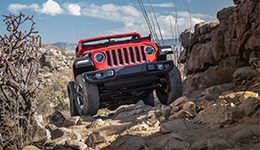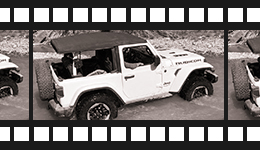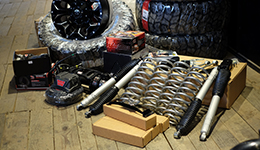4 Wheel Drive Tips
Time:2019-05-20
The Basic Information on Owning a 4 Wheel Drive Vehicle
How are 4 wheel drive vehicles diff erent than other vehicles?
Drivers have a higher seating position and better vision of the road.
A 4WD recreational vehicle has a higher center of gravity. It offers a combination of tires and long travel suspension that are a compromise between on-road and off-road capability. The vehicle may not hug the road as well as a driver is used to and it is likely to have greater mass than a car to slow down.
Research shows 4WD vehicles are more likely to roll over than other light vehicles. The chances of a vehicle rolling over also increase with each additional passenger. A fully loaded 4WD vehicle is more likely to roll after a sudden evasive maneuver or fast cornering than a 4WD vehicle containing only a driver.
In a vehicle collision, heavier 4WD vehicles can do a serious amount of damage to people in other vehicles. And some older 4WD vehicles may not have the built-in crumple zones that modern cars benefit from.
Rollover crashes have been identified as a major cause of spinal injury.
In terms of crash test worthiness, studies have found 4WDs fared better than mid-sized and compact cars, vans and commercial vehicles. However, overall, luxury and large cars do a better job of preventing severe injury to the driver.
All of this means 4WD drivers are wise to take more care, and modify their driving style from how they would drive a car. See the driving tips below.
How are 4 wheel drive vehicles different than other vehicles?
Anti-rolling design features.
Strong roof support pillars.
ABS brakes.
Dual airbags.
Side intrusion bars.
Side air bags.
Headrests for all seating positions.
A lap-sash belt for the middle passenger in the second row of seats.
4 wheel drive vehicles are the safest for other drivers when they
Do not have bull bars.
Do have crumple zones.
Are driven by people who have been trained in their use.
After purchasing your 4 Wheel Drive vehicle, carefully read these driving tips
Go around corners MORE SLOWLY than you would in a car - the higher center of gravity means your 4WD vehicle handles differently, and you need to allow for this.
As with any vehicle, always wear a well-adjusted safety belt. 4WD recreational vehicles are more likely to roll over in a crash than other vehicles - wearing a safety belt is the best way to protect your neck and spine. Safety belts also keep you in the vehicle - anyone thrown from a vehicle is highly unlikely to survive if their vehicle rolls onto them.
Be very mindful of other road users given the greater degree of injuries 4WD recreational vehicles inflict.
Place heavy items inside the vehicle behind a cargo barrier, and only put light items on a roof rack.
Increase your following distance - it may take you longer to stop than in a car.
Remember that while the size and shape of your 4WD may improve your field of vision, it can reduce the field of vision for other road users.
Because you have a higher center of gravity, drive defensively - you are much safer if you never have to make any sudden swerving or evasive moves.
If you don't need bull bars for off-road travel, don't have them fitted - they can be lethal for other road users.
Most Importantly
Remember that you are not any safer in your 4WD recreational vehicle than you would be in a car - appreciate the handling characteristics of your 4WD and modify your driving style accordingly.
Taking an Offroad Trip?
If you are going to use your 4WD off-road it makes sense to join a four wheel drive club in your area. Ask your local dealer or a specialist off-road training provider for more information.





